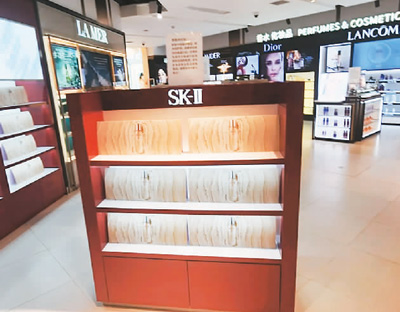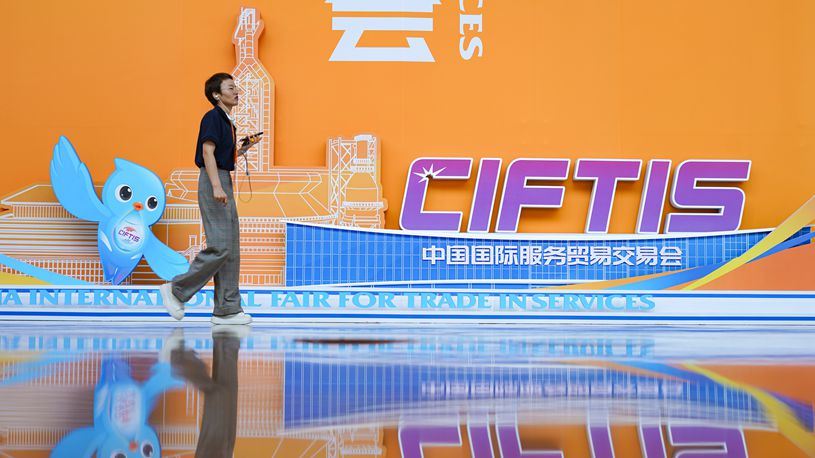Downtown duty-free shops offer more options for consumers

Photo shows a downtown duty-free shop in Chaoyang district, Beijing. (People's Daily Overseas Edition/Liao Ruiling)
According to a statement jointly made by five departments, including the Ministry of Finance, duty-free stores will be opened in the eight cities of Guangzhou, Chengdu, Shenzhen, Tianjin, Wuhan, Xi'an, Changsha and Fuzhou, starting Oct. 1, 2024.
According to Hong Yong, an expert from the China Digital and Real Economy Integration 50 Forum, a Beijing-based think tank, China has different types of duty-free shops, such as those located at ports, offshore duty-free shops, and duty-free shops for means of transportation.
Downtown duty-free shops are conveniently located and offer flexible shopping hours, making them a popular choice for travelers.
"Downtown duty-free shops offer a more comfortable shopping experience with extended hours compared to port duty-free shops. Unlike offshore duty-free shops, downtown duty-free shops are not constrained by location and can attract a broader customer base through local and nearby consumers. This can lead to a boost in commercial activities, longer stays for tourists, and the potential growth of surrounding business areas," explained Hong.

Photo shows a downtown duty-free shop in Chaoyang district, Beijing. (People's Daily Overseas Edition/Liao Ruiling)
Currently, there are 13 foreign exchange goods duty-free shops in cities such as Beijing, Shanghai, Qingdao, and Dalian, and six downtown duty-free shops in Beijing, Shanghai, Qingdao, Dalian, Xiamen, and Sanya.
Foreign exchange goods duty-free shops mainly target Chinese travelers with entry records within 180 days, while downtown duty-free shops cater primarily to foreign consumers and those from the Hong Kong and Macao special administrative regions, and the Taiwan region.
According to the statement, the 13 foreign exchange goods duty-free shops shall be transformed into downtown duty-free shops.
A recently released interim measures for the administration of duty-free shops in cities stated that duty-free shops in cities are for travelers, including but not limited to the Chinese nationals who will be departing the country by air or international cruise within 60 days.
This means that downtown duty-free shops, originally catering to foreign consumers and those from the Hong Kong and Macao special administrative regions, and the Taiwan region, will also serve travelers from the Chinese mainland with outbound travel plans.
After being transformed into downtown duty-free shops, foreign exchange goods duty-free shops will allow both Chinese and foreign customers to shop there.

Photo shows a duty-free shop of Sinopharm China National Service Cooperation, located in Xicheng district of Beijing. The foreign exchange goods duty-free shop will be transformed into a downtown duty-free shop by the end of 2024. (People's Daily Overseas Edition/Liao Ruiling)
Furthermore, the range of products available for sale will be more diverse. In addition to familiar consumer goods such as food, clothing, accessories, bags, shoes, baby care products, jewelry, electronics, fragrances, and alcohol, the interim measures also encourage the sale of "Guochao" products, products that combine modern designs and traditional Chinese cultural elements, as well as specialty items.
Vigorously promoting the development of downtown duty-free shops is conducive to the establishment of Chinese duty-free brands.
According to data from the China Tourism Academy, Chinese tourists made more than 87 million outbound trips in 2023, and it is estimated that this year the number will reach 130 million.
"The outbound tourism boom signifies a massive consumption volume. In the past, Chinese travelers were often attracted to special duty-free products in certain countries, such as cosmetics in South Korea and electronics in Japan," said Tang Xiaowen, who has worked at a well-known skincare chain store in South Korea for over five years.
The new measures encourage downtown duty-free shops to promote and develop the popularity of Chinese branded goods, like "Guochao" products. With time, those products could appeal to global consumers the same way South Korean cosmetics and Japanese electronics do for consumers today.
Data from the National Immigration Administration (NIA) shows that China recorded nearly 14.64 million inbound trips made by foreigners in the first half of this year, up 152.7 percent year on year.
As a consumption venue, downtown duty-free shops offer departing travelers a wider range of shopping options. Hong believes that if foreign tourists, overseas students, and other groups promote "Guochao" products they buy from downtown duty-free shops in China when they are back home, it will contribute to the establishment of Chinese duty-free brands.
Photos
Related Stories
- China adjusts duty-free policy to boost consumption
- Macao SAR gov't thanks central gov't for new duty-free measures
- China to raise duty-free limit for mainland visitors to HK, Macao
- Number of Hainan duty-free shoppers top 6.23 million in Jan-Nov
- Hainan logs billions in offshore duty-free sales over 12 years
- Hainan sees offshore duty-free sales up 14.6 pct in Q1
- China's resort island posts surging duty-free sales during Spring Festival
Copyright © 2024 People's Daily Online. All Rights Reserved.









